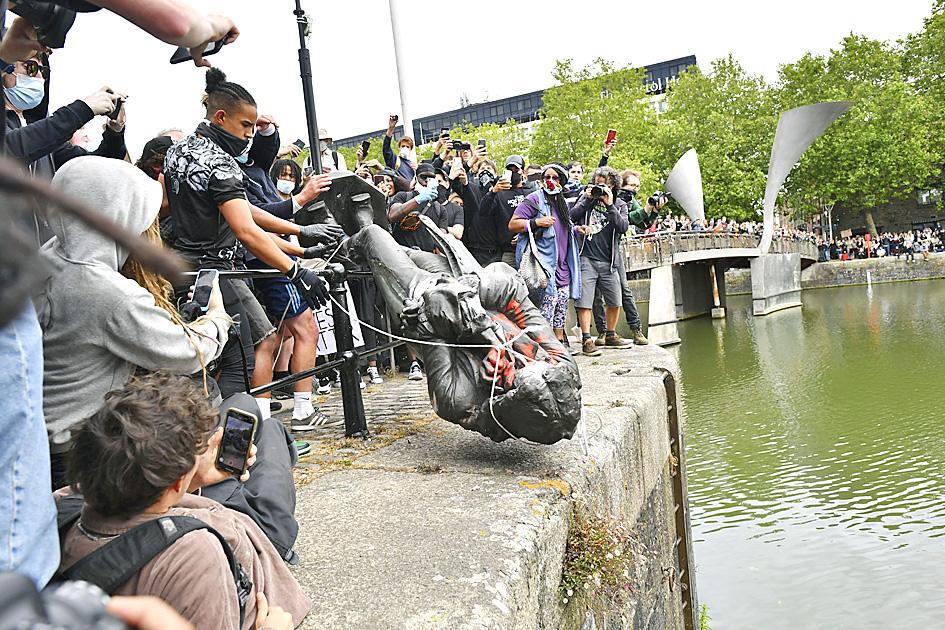A statue of slave trader Edward Colston that was toppled from its plinth and pushed into the docks by protesters has long caused anger and divided opinion in Bristol, England.
The 5.5m bronze statue had stood on Colston Avenue since 1895 as a memorial to his philanthropic works, an avenue he developed after divesting himself of links to a company involved in the selling of tens of thousands of slaves.
His works in the city included money to sustain schools, almshouses and churches.

Photo: AP
Although Colston was born in the city in 1636, he never lived there as an adult.
All his slave-trading was conducted out of the City of London.
Colston grew up in a wealthy merchant family in Bristol and after going to school in London he established himself as a successful trader in textiles and wool.
He sold his shares in the company to William, Prince of Orange, in 1689, after the latter had orchestrated the Glorious Revolution and seized power from King James the year before.
Colston then began to develop a reputation as a philanthropist who donated to charitable causes, such as schools and hospitals in Bristol and London.
He briefly served as a Conservative member of parliament for Bristol before dying in Mortlake, Surrey, in 1721. He is buried in All Saints Church in Bristol.
His philanthropy has meant the Colston name permeates Bristol. There is Colston’s, an independent school named after him, along with a concert hall, Colston Hall; a high-rise office office block, Colston Tower; Colston Street and Colston Avenue.
Campaigners have argued for years that his connections with slavery mean his contribution to the city should be reassessed. It was decided in 2018 to change the the statue’s plaque to include mention of his slave-trading activities, but a final wording was never agreed.
A petition that gathered thousands of signatures last week said he had “no place” in the city.
“Whilst history shouldn’t be forgotten, these people who benefited from the enslavement of individuals do not deserve the honor of a statue. This should be reserved for those who bring about positive change and who fight for peace, equality and social unity,” the petition reads.
“We hereby encourage Bristol City Council to remove the Edward Colston statue. He does not represent our diverse and multicultural city,” it says.
Bristol Museums has sought to explain the reason for the statue remaining in the city and says on its Web site that “Colston never, as far as we know, traded in enslaved Africans on his own account.”
“What we do know is that he was an active member of the governing body of the RAC [Royal African Co], which traded in enslaved Africans, for 11 years,” it said.

ELECTION DISTRACTION? When attention shifted away from the fight against the militants to politics, losses and setbacks in the battlefield increased, an analyst said Recent clashes in Somalia’s semi-autonomous Jubaland region are alarming experts, exposing cracks in the country’s federal system and creating an opening for militant group al-Shabaab to gain ground. Following years of conflict, Somalia is a loose federation of five semi-autonomous member states — Puntland, Jubaland, Galmudug, Hirshabelle and South West — that maintain often fractious relations with the central government in the capital, Mogadishu. However, ahead of elections next year, Somalia has sought to assert control over its member states, which security analysts said has created gaps for al-Shabaab infiltration. Last week, two Somalian soldiers were killed in clashes between pro-government forces and

Ten cheetah cubs held in captivity since birth and destined for international wildlife trade markets have been rescued in Somaliland, a breakaway region of Somalia. They were all in stable condition despite all of them having been undernourished and limping due to being tied in captivity for months, said Laurie Marker, founder of the Cheetah Conservation Fund, which is caring for the cubs. One eight-month-old cub was unable to walk after been tied up for six months, while a five-month-old was “very malnourished [a bag of bones], with sores all over her body and full of botfly maggots which are under the

BRUSHED OFF: An ambassador to Australia previously said that Beijing does not see a reason to apologize for its naval exercises and military maneuvers in international areas China set off alarm bells in New Zealand when it dispatched powerful warships on unprecedented missions in the South Pacific without explanation, military documents showed. Beijing has spent years expanding its reach in the southern Pacific Ocean, courting island nations with new hospitals, freshly paved roads and generous offers of climate aid. However, these diplomatic efforts have increasingly been accompanied by more overt displays of military power. Three Chinese warships sailed the Tasman Sea between Australia and New Zealand in February, the first time such a task group had been sighted in those waters. “We have never seen vessels with this capability

‘NO INTEGRITY’: The chief judge expressed concern over how the sentence would be perceived given that military detention is believed to be easier than civilian prison A military court yesterday sentenced a New Zealand soldier to two years’ detention for attempting to spy for a foreign power. The soldier, whose name has been suppressed, admitted to attempted espionage, accessing a computer system for a dishonest purpose and knowingly possessing an objectionable publication. He was ordered into military detention at Burnham Military Camp near Christchurch and would be dismissed from the New Zealand Defence Force at the end of his sentence. His admission and its acceptance by the court marked the first spying conviction in New Zealand’s history. The soldier would be paid at half his previous rate until his dismissal